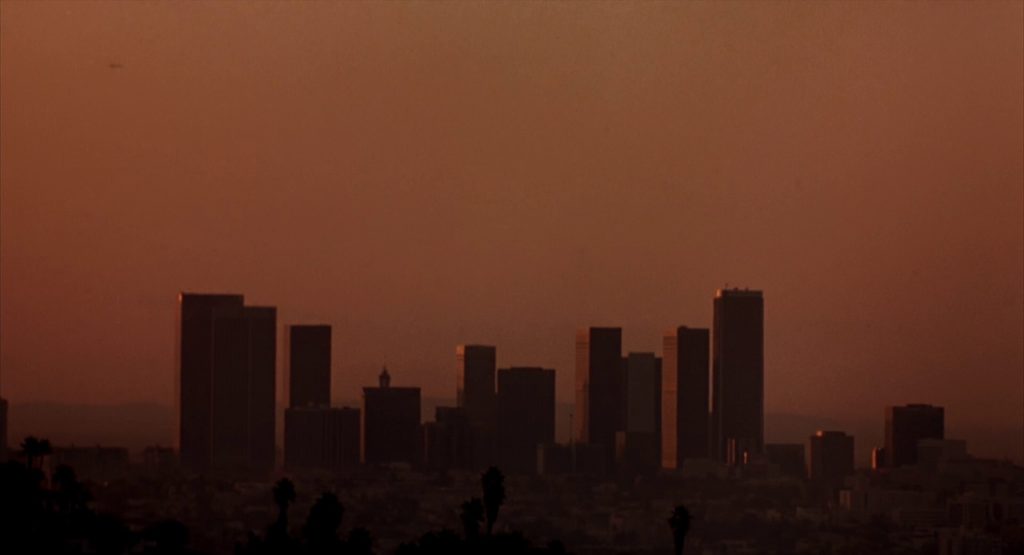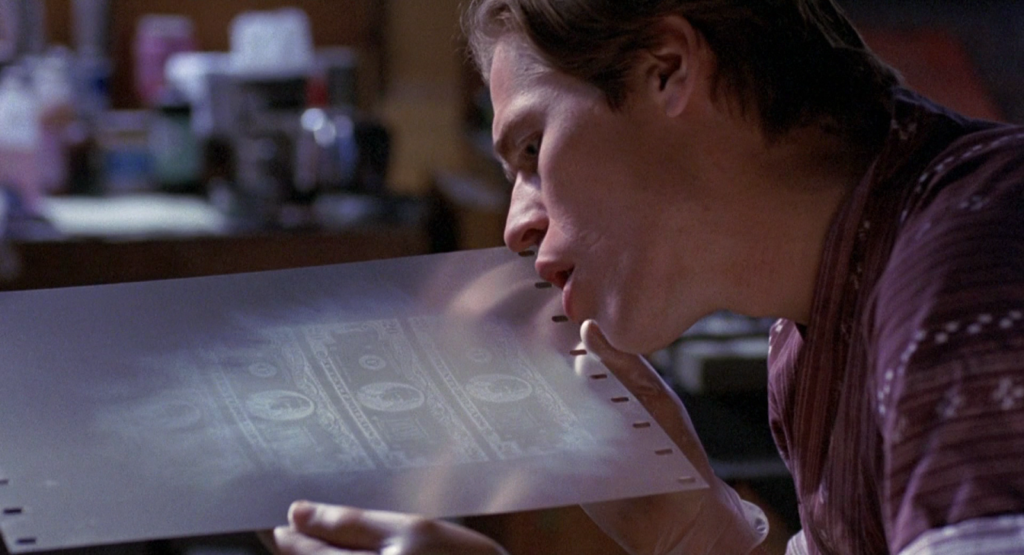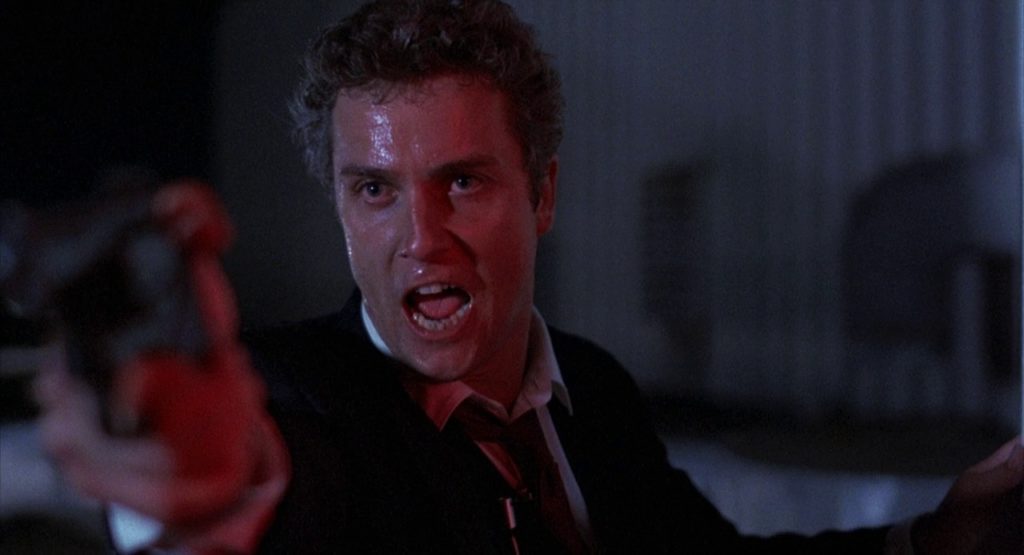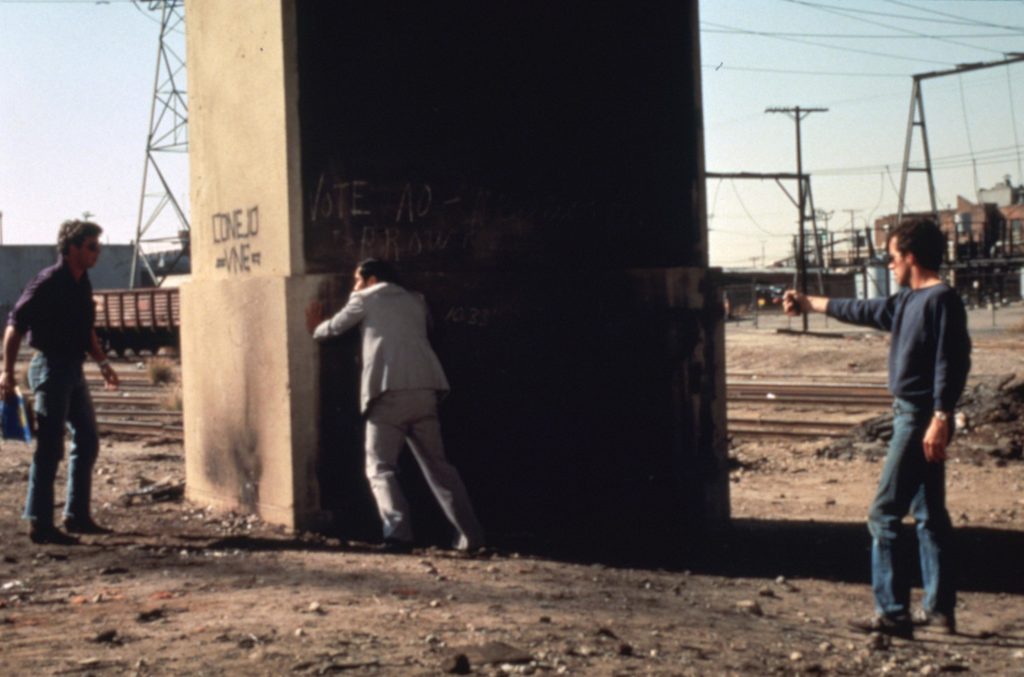| Lucas Hardwick |

To Live and Die in L.A plays at the Trylon Cinema from Sunday, December 3rd, through Tuesday, December 5th. Visit trylon.org for tickets and more information.
(And behold, let thine eyes be warned; yay verily, here there be spoilers, so sayeth the Lord.)
One of the cornerstones of any healthy marriage is to go out on a date once in a while. Occasionally, I like to take Mrs. Hardwick to a fancy joint like the McDonald’s on the good side of town. Now before you start throwing rotten eggs at the screen and sending a bunch of hateful e-mails to the editorial staff at Perisphere about dating etiquette, it’s important to note the degree of decadence that’s currently reflected in the prices of some of McDonald’s staple menu items. Personally, I prefer the efficiency of the Two Cheeseburgers Meal which includes two cheeseburgers, medium fries, and a Coke. This option usually leaves me and the Missus with enough cash to play a round of putt-putt or go bowling as long as we use our coupon booklet from the county high school marching band; the going rate for this most economical menu item is still a staggering $10.99* plus tax. It’s only after winning a few scratch-offs or maybe when the tax return clears that we might splurge and go for our own individual Quarter Pounder Meals at the “trickle-down” rate of $13.39 each.
With prices “higher than a cat’s back,” as my dad used to say, it’s not hard to consider taking on a second full-time job at the local Wendy’s for the starting salary of up to $17 an hour. Finally, a living wage for honest work! With an extra $35,000 a year in my pocket, I can almost justify the $15.29 Quarter Pounder Deluxe Meal. This might otherwise be an easy call to make, but a quick run for milk, eggs, and Little Debbie Christmas Tree Cakes, along with a handful of other essentials at the grocery store will usually leave you fifty dollars lighter in the blink of an eye at the self check-out. Besides the commodities for survival, most of us are also playing Sophie’s Choice with our streaming services—who’ve even figured out that they’re too good to be true—every month for the sake of, God forbid, a few hours of entertainment to nod off to before waking up to go break rocks for the corporations that have jacked up the prices of existence to begin with.
Of course, I’m talking about the formidable institution of inflation: a force as constant and unstoppable as the long-standing estates of Death and Taxes. The three-year COVID pandemic fast-forwarded prices of regular stuff six years into the future in just a matter of months. Compound that with the capitalist resolve of corporations to not just make enough money in the world, but their perennial mission to make all the money in the world, and you got yourself an open-ended economic crisis that has middle-class people pinching pennies to treat themselves to a fast-food suck down.

“Dooddlie-doop. Doodllie. Dooddlie-doop. Doodllie. ‘In the heat of the day, every time you go away, I have to piece my life together.’”
It’s times like these a guy like Eric “Rick” Masters (Willem Dafoe) starts to look like the smartest person in the room. Rick’s in the business of printing his own “paper,” as it were, and selling it in exchange for the real stuff; a good old fashioned Guilded Age counterfeit operation, except Rick’s printing meticulously accurate play-dough instead of stuffing suitcases full of sawdust. Rick is a pretty good expressionist painter, unless of course he’s an accidental expressionist painter, which means if he’s a realist painter—just look at the cross-hatching on those Benjamins—then he’s a pretty bad painter in a traditional sense. But we’ll never know for sure because he burns most of his work. What he’s a real master of, if you will, is replicating U.S. legal tender.

“Hhhhhhhhh….”
Rick’s not a bad guy—morally misguided perhaps—but according to the snippets of President Reagan’s speech on tax reform peppered in the background at the beginning of William Friedkin’s masterpiece To Live and Die in L.A., his intent is as American as our forefathers who sought no taxation without representation. Rick’s just trying to make a living and he knows what he’s good at. In America, if you’re good at something, you never do it for free. And in 1985, when a McDonald’s Two Cheeseburgers Meal was then its own bank-breaking $2.99, who can blame him.
As far as U.S. Secret Service Agent Richard Chance (William Petersen) is concerned, Rick can print all the money he wants. Agent Chance is more interested in snagging Masters for killing his long-time Secret Service partner just moments before his retirement and on Christmas Eve at that! And with his ex-hooker informant girlfriend Ruth (Darlanne Fluegel) who lives under the interminable threat of a revoked parole and a little sexual extortion, Chance has all he needs to keep America’s financial and tax infrastructure safe from scofflaws like Rick Masters.

Trickle this!
Agent Chance isn’t exactly a good guy—definitely morally misguided—and according to President Reagan’s speech at the beginning of William Friedkin’s masterpiece To Live and Die in L.A. his job as a Federal Agent is to uphold America’s foundation of “no taxation without representation” (but taxation, nonetheless). And when Rick Masters is dodging millions of dollars in taxes and killing Federal agents at Christmas time, who can blame him.
Friedkin’s poetic propensity for mirrored duality has us hankerin’ for a hunk of Doublemint. Eric Masters goes by “Rick” which is short for Richard making Richard another version of Eric. Agent Chance’s favorite shirt is a football jersey emblazoned with a big navy blue “52” on the front of it. The number “52” is not only never the sum of proper divisors of any number, it’s also visually symmetrical. Rick Masters and Richard Chance are two sides of the same coin. One is a master of chance, printing funny money to get ahead in a financially escalating world, the other takes life-altering chances to be a master of his occupation for the sake of his own personal vendetta and the security of the United States financial system.
In his speech on tax reform early in the film, President Reagan states, “in both spirit (Chance) and substance (Masters), our tax system (America) has come to be un-American.” These two institutions of freedom and security have diverged so drastically that the very foundation of what we know as America has become confused with the extremities of greed and power. And not unlike the juggernaut of inflation driving everyone to these extremes, it’s a struggle that’s as relevant today as it was in 1985.
Good or bad, this observation of an un-American America is coming from the highest law in the land (though it could be argued that “it’s your administration’s tax system, silly,” which is a whole ‘nother point in Friedkin’s cinematic dissertation on America’s ongoing financial crisis). Reagan goes on to recount that the first American Revolution was sparked by the tyranny of taxation without representation and then alludes to a second American revolution two centuries later as his speech fades out suggesting that revolution is about to unfold before us in the shape of Rick Masters and Richard Chance.
Friedkin implies America’s misguided priorities right away when Chance and his partner, Agent Jim Hart (Michael Greene), fail to apprehend an Islamic terrorist who blows himself up on the rooftop of the very hotel Reagan is speaking in. These guys can’t catch a terrorist with dynamite strapped to his chest, but Agent Chance goes the distance and accidentally gets an undercover FBI agent killed later in the film while trying to illegally secure the funds for his own undercover operation to snag funny money-boy Rick Masters.

“Well, well, what do we have here?”
We get the idea all along that Chance isn’t really a great guy, but his acting on his reckless fury is where most of us begin to part ways with him. As Chance and Masters up the ante on who is more dedicated to their endgame, we see what the “good guys” are really capable of. The irresponsible blind rage that accidentally results in the killing of one of their own is when we start looking around the room trying to quietly back out a secret exit. It’s at that moment that it becomes clear, no matter how violent, that we kind of relate to Masters’ defense of his disreputable livelihood. Friedkin’s mirror image theme of opposing ideals culminates in the visual poetry of a thrilling car chase where Agent Chance runs for his life up an L.A. freeway against oncoming traffic.
The truth is, both of these men are capable of killing, but self-defense and defense of possessions are psychologically more approachable than the scary idea that our own selfish passions could become so heightened that it results in the murder of innocent people. Anyone playing with Masters is playing with fire (almost literally) and kind of has it coming. The accidental killing of an undercover FBI agent is sadly the consequence of gross indiscretion in the wake of unwary impulses which is far more sickening, not only for the obvious reasons, but it really gets into those morally gray areas that most of us prefer to avoid.
Is printing money really so bad? I mean, we get it, right? If only, and in a perfect world, but it does undermine, oh, the entire working class of the United States. Is resolving one’s own parsimonious mania at any cost really so bad? For any of us who have loved ones, well, we get that too, don’t we. But the potential for hurting others is where most of us draw the line because blind rage has a threshold that eventually undermines good intentions.
The end of the film signifies a troubling systemic condition that’s ripe with the ingredients for creating loose cannons like Agent Chance. This flawed institution also begets the incidental culprits that exist as a comment on the system. Neither of these entities, Chance or Masters, should be allowed to continue in their extreme capacities, but one does by the very problematic nature of its necessity. Richard Chance lives on in the now-corrupted spirit of his once-upstanding partner John Vukovich (John Pankow).
While Chance and Masters are dispatched for their sins, counterfeiters and corrupt authorities will always have a place in the world as long as the confounding issues of a capitalist society persist. And though the price of the Two Cheeseburgers Meal will continue to hit new exorbitant prices for each new economic crisis, and me and the Missus will still have to split the fries and the Coke.
*Menu prices from: https://americanmenuprices.com/mcdonalds-menu-prices-usa/
Edited by Olga Tchepikova-Treon
